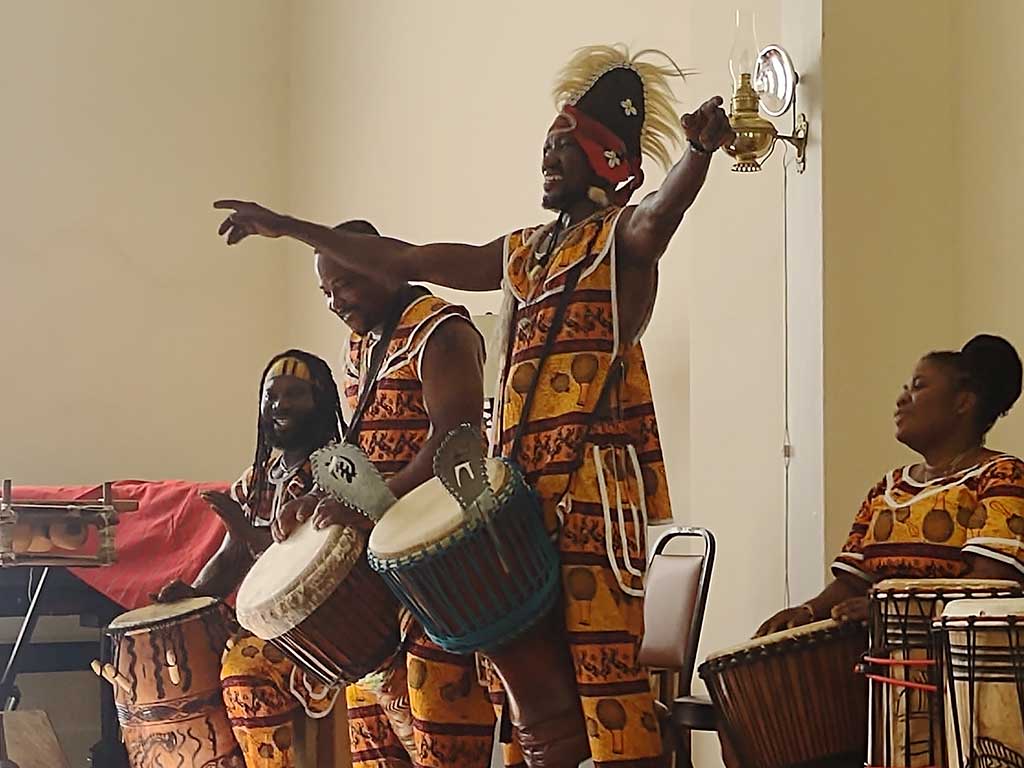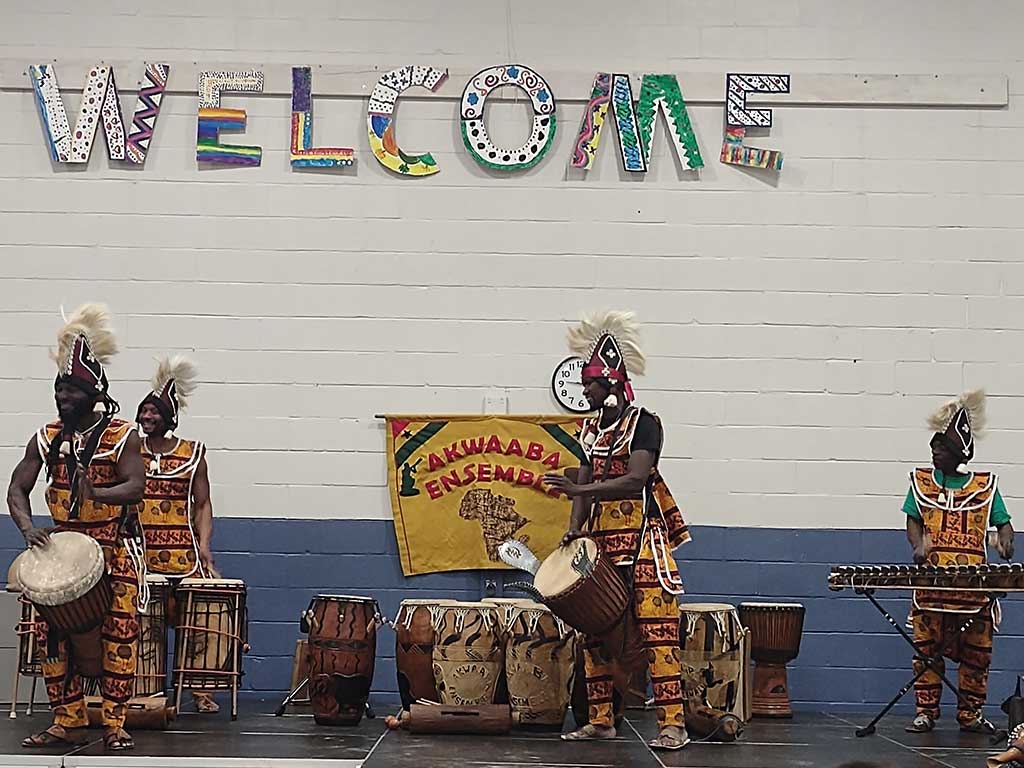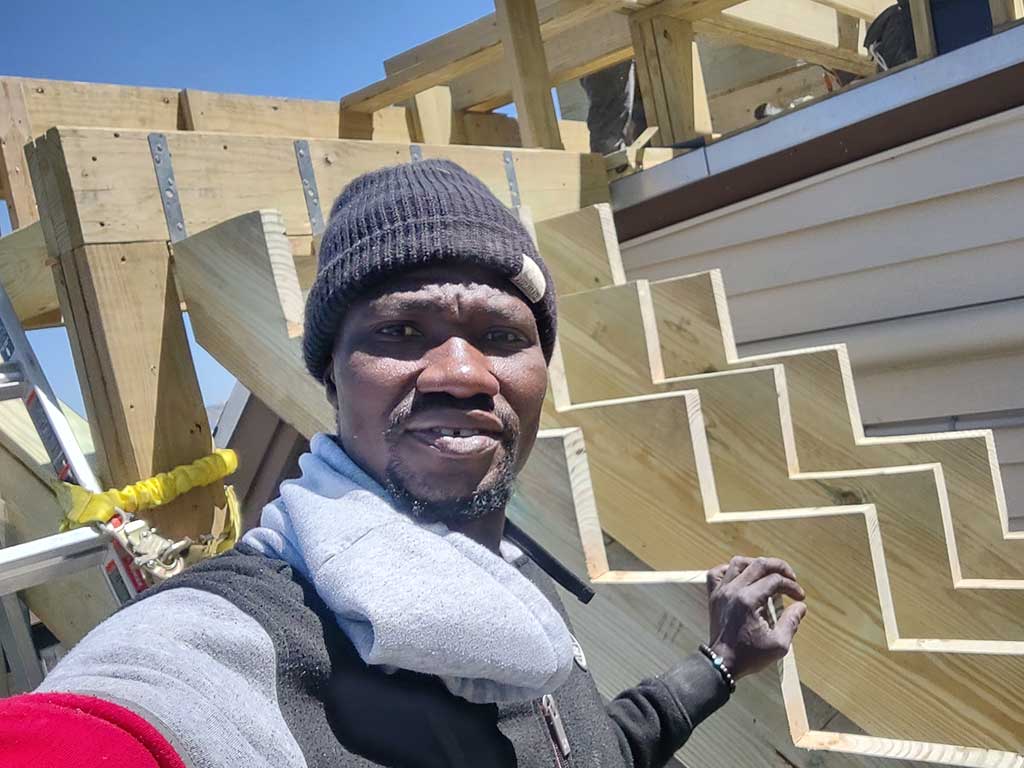
Namory Keita: Celebrating Life with Music
Every month PelotonLabs co-founder Liz Trice interviews a local Peloton or community member. This month, Liz caught up with Namory Keita, a Guinean master drummer who is one of eight traditional artists and ensembles that received a micro grant from the Traditional Arts Network (TAN) Fund.

Congratulations!
Thank you. I’m glad to be in Maine here and share my culture and help create a community in Maine.
When did you come to Maine? What was your life like in Guinea?
I came to New Hampshire in 2010 and moved to Maine in 2015.
In Guinea, in the village I am from, before I left it was about 2,500 people. My parents worked in traditional agriculture – farming for our own food. Many of the activities are “hand work”: growing food, cutting trees, fishing, blacksmithing, carving drums. And the work, everything is collective.
It was just me and my brother, and my parents were not happy in me going to school because they wanted me to be a farmer, so I didn’t start school until I was nine years old.
In my village we celebrated life with music. So, I learned how to play drums from childhood – even if we didn’t have enough to eat, we were joyful with our music and our singing, and imitating our parents drumming – even on a tomato can. At school we weren’t allowed to play, but then after school we joined the kids in the village drumming.
When you are ten years old, you can’t sleep at your parents’ house, so you find your own place to stay. Your parents might push you because of the intimacy between parents; the house is small and round, and the floor is hay. You might move to sleep at your grandma’s house, or you might stay with your friends. If one family has an empty house, all the kids will go stay there, and then be under that parent’s control. We drummed with those friends. Beside houses in the village, we have a public place where everyone can meet, and we have the elder’s house where the chief lives, and when there’s an issue, everyone brings it to the chief to find a solution.

I served my village as a drum leader, then my country. Then I went to Germany, Portugal, Poland, France, then went back to Guinea, then came to New Hampshire for six months, then back to Guinea, then back to New Hampshire and decided to stay to establish my family’s life.
What does it mean to be a drum leader?
The drum leader is the person who interacts with the people who dance or sing. The original life in my village – we enjoy ourselves with the full moon because we don’t have electricity. Everybody goes to visit friends in the night, and at your friend’s house, your friend might be working on something, and you help, or your friend might have food, and you eat. When you visit someone, the first question the person asks is: “Do you want to eat?”
What are your plans for the Traditional Arts Network grant?

When I moved here I lost everything – I lost everything – my parents, the woman who brought me here. I feel blessed in Portland, and I healed that pain. And I joined a community here, doing the performances, teaching the classes.
I have a dream to build a school for West African Culture called Amana a Santa to preserve the culture, first in Guinea, and if I go forward, I could plant the same school here. I would love to do that in Maine also. I’m on my own doing this through my own dream. I put the money I get from drumming into that dream. And I have a full-time job with Blue Jay Carpentry.
More on Traditional Arts Network
The Traditional Arts Network (TAN) grants are for newly arrived artists and ensembles in Maine bearing cultural and artistic heritage from their countries of origin. The grants range from $500 – $1,000. The funds help New Mainer artists overcome short-term financial hurdles or lay the foundation for long-term goals. TAN is a collaboration between Mayo Street Arts (MSA) and Cultural Resources. The grant funds came from the Maine Arts Commission. In addition to the TAN Fund, the network organizes artist gatherings and offers a Traditional Arts Apprenticeship program to support the education of a new generation of traditional artists.
To request more information and/or assistance, please email TAN@mayostreetarts.org. Or call Mayo Street Arts at 207-879-4629.
Visit the Traditional Arts Network website at: https://www.mayostreetarts.org/TAN.
PelotonLabs is a coworking space in the West End of Portland, Maine with a mission to connect and encourage people working on their own to manifest their visions without fear.
PelotonPosts is created by PelotonLabs. WEN provides column space without charge. PelotonLabs has been a paid advertiser. WEN publisher and editor Tony Zeli is a coworking member at PelotonLabs.





